新概念二册课件Lesson29 Taxi!(共57张PPT)
文档属性
| 名称 | 新概念二册课件Lesson29 Taxi!(共57张PPT) |
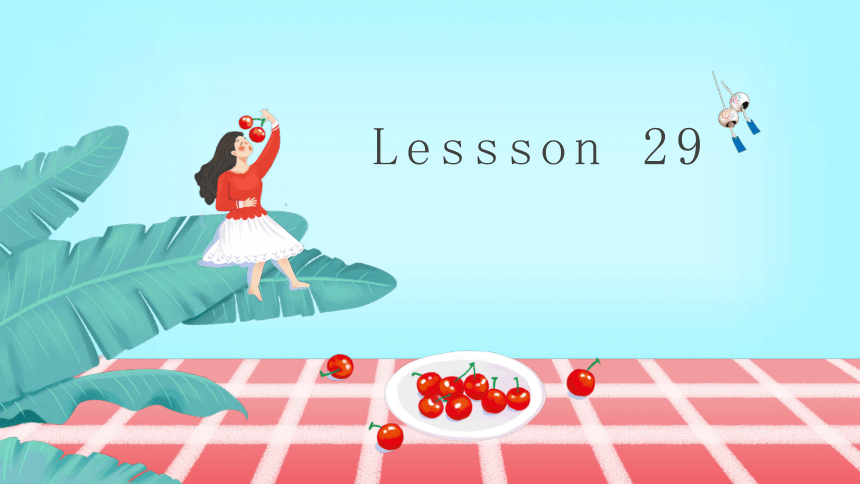
|
|
| 格式 | pptx | ||
| 文件大小 | 9.4MB | ||
| 资源类型 | 教案 | ||
| 版本资源 | 新概念英语 | ||
| 科目 | 英语 | ||
| 更新时间 | 2021-03-19 15:25:31 | ||
图片预览


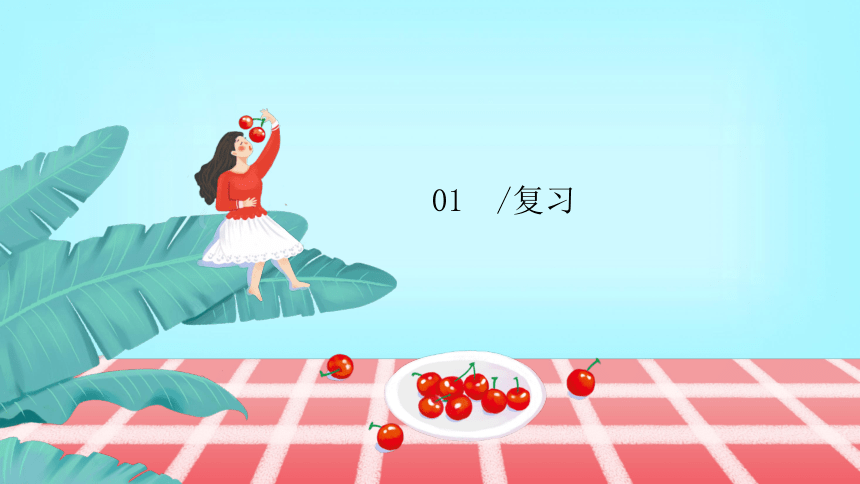
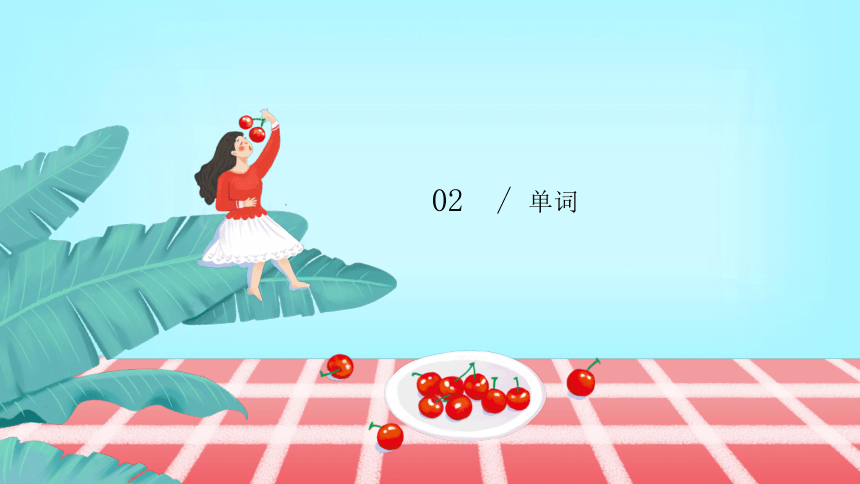
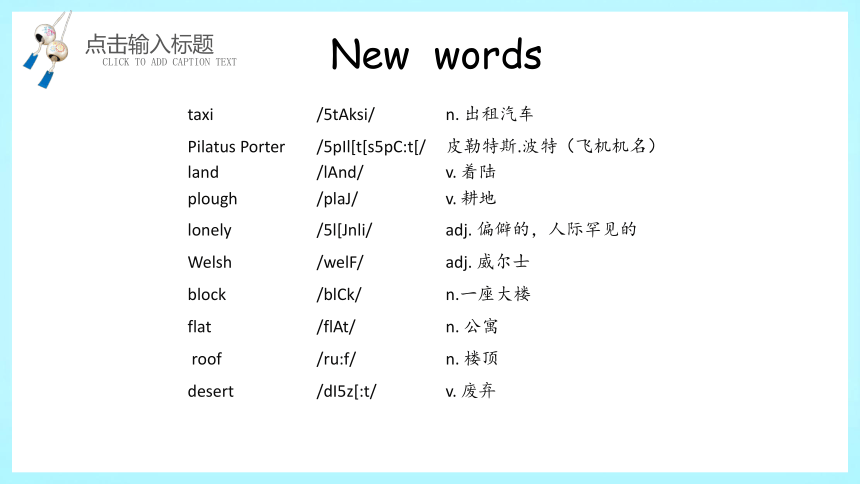
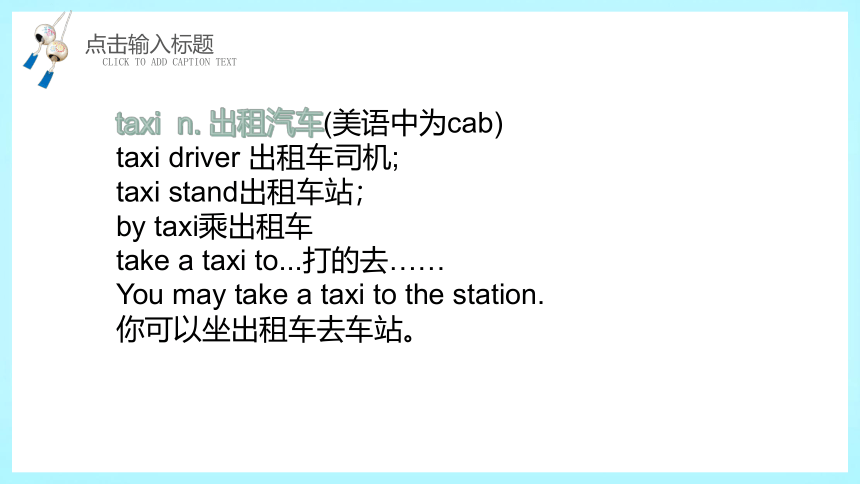

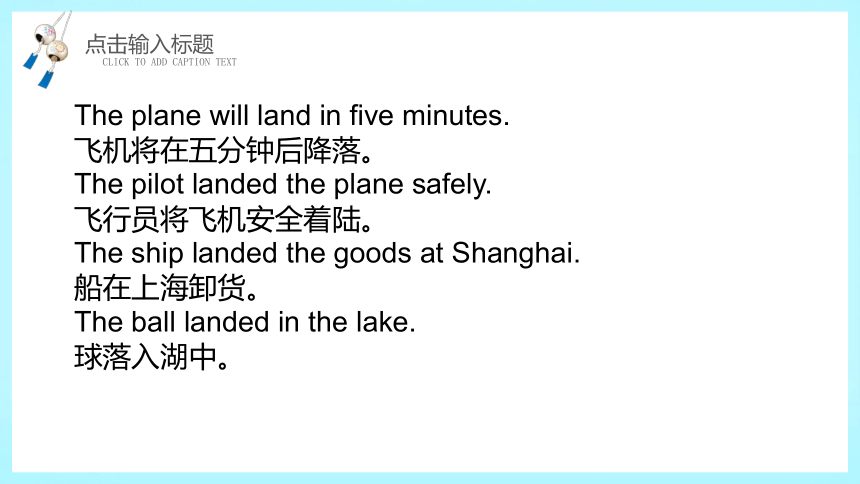

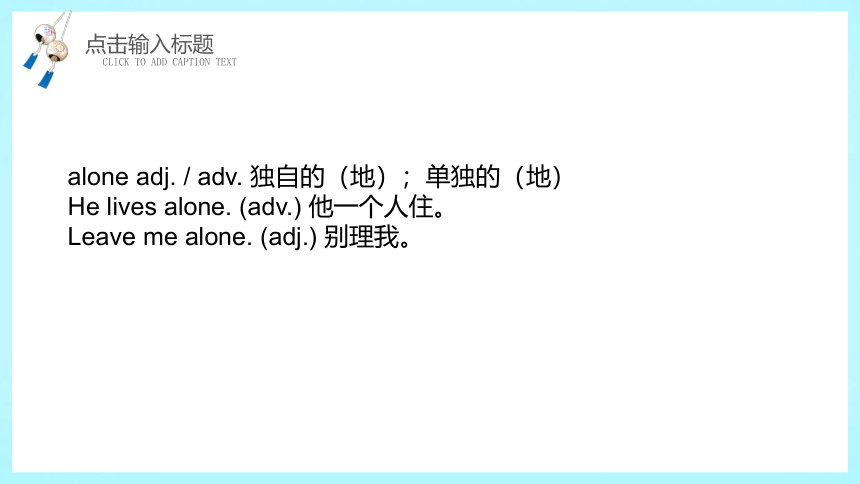
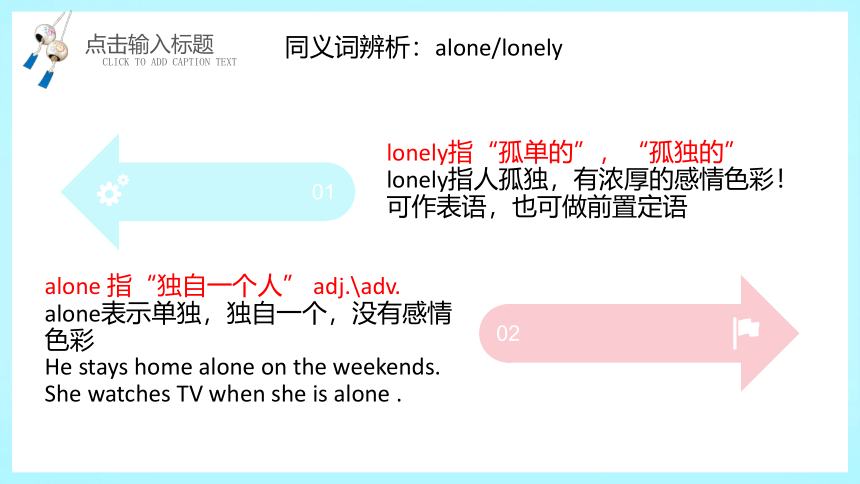

文档简介
Lessson 29
01 /
02 /
03 /
复习
单词
语法
目录
04/
课文
01 /复习
02 /
单词
taxi /5tAksi/ n. 出租汽车
Pilatus Porter /5pIl[t[s5pC:t[/ 皮勒特斯.波特(飞机机名)
land /lAnd/ v. 着陆
plough /plaJ/ v. 耕地
lonely /5l[Jnli/ adj. 偏僻的,人际罕见的
Welsh /welF/ adj. 威尔士
block /blCk/ n.一座大楼
flat /flAt/ n. 公寓
roof /ru:f/ n. 楼顶
desert /dI5z[:t/ v. 废弃
New words
taxi n. 出租汽车(美语中为cab)
taxi driver 出租车司机;
taxi stand出租车站;
by taxi乘出租车
take a taxi to...打的去……
You may take a taxi to the station.
你可以坐出租车去车站。
land
1) n. 陆地,土地,地(不可数)
祖国(喻)mother land
Two thirds of the land is desert.
三分之二的土地是沙漠
2) vi&vt. (使)着陆
The plane can land anywhere.
这架飞机能在任何地方着陆。(不及物,无宾语)
The pilot was trying to land the damaged plane safely.
这个飞行员试图使这架损坏的飞机安全着陆。(及物)
The plane will land in five minutes.
飞机将在五分钟后降落。
The pilot landed the plane safely.
飞行员将飞机安全着陆。
The ship landed the goods at Shanghai.
船在上海卸货。
The ball landed in the lake.
球落入湖中。
lonely adj.
1) adj. 孤寂的,寂寞的
Although he lives in a big family, he feels very lonely.
尽管他住在一个大家庭里,他还是觉得很孤独。
2) adj. 修饰地点,指地方偏僻的,人迹罕至的
a lonely island 一座孤岛
alone adj. / adv. 独自的(地);单独的(地)
He lives alone. (adv.) 他一个人住。
Leave me alone. (adj.) 别理我。
01
02
lonely指“孤单的”,“孤独的”
lonely指人孤独,有浓厚的感彩!
可作表语,也可做前置定语
alone 指“独自一个人” adj.\adv.
alone表示单独,独自一个,没有感彩
He stays home alone on the weekends.
She watches TV when she is alone .
同义词辨析:alone/lonely
alone无不愉快的含义,lonely含不愉快的含义。
alone作形容词不可放名词前,只能做表语,补语,后置定语。
lonely可作表语,也可做前置定语
roof
1) n. 房顶,车顶,顶部 pl. roofs
have no roof over one’s head
没有地方住
2) n. 最高处
the roof of the world 世界屋脊
the roof of the mouth 上颚
3)天花板
hit the roof 大发雷霆
raise the roof 闹翻了天
no roof over one’s head
无家可归
under one’s roof
住在自己家里
under sb’s roof
在某人家做客;寄人篱下;在某人照应下
hit the roof
[美口] 勃然大怒,暴跳如雷
block
1) n. (木,石,金属等的)大块
a block of rock 一大块岩石
2) n. 大建筑物,大楼(内有许多相互独立的公寓或办公室的)
a block of flats 一栋公寓楼
3) 街区
The two buildings share the block.
这两栋建筑物整整占满了这个街区。
4) 障碍物
a block in the pipes管道阻塞
put up a road block设置路障
a block in traffic交通阻塞
flat
1) n. 公寓,单元房,一套房间
apartment [?'pɑ:tm?nt] 美语多用这个词表示公寓
2) adj. 平坦的
flat land 平原
3) adj. 泄了气的,瘪下去的
flat tyre 瘪了的轮胎
4) adj. 浅的,扁的
a flat dish 浅碟子
The cake was flat.
这个蛋糕没有发起来。
desert
1) ['dez?t] n. 沙漠,荒漠
the Sahara [s?’hɑ:r?] Desert 撒哈拉大沙漠
2) [di'z?:t] v. 离弃,放弃,遗弃
desert sb / desert sp(someplace) 抛弃某人,放弃某个地方
desert 强调丢弃,抛弃
desert a house 放弃一个房子
desert a city 放弃一座城市
3) deserted [d?’z?:t?d] adj. 无人的
a deserted street 空无一人的大街
a deserted office 空荡荡的办公室
a deserted area 无人地区
deserted adj. 被离弃的,被遗弃的,被抛弃的
a deserted wife 被抛弃的妻子
a deserted house 被遗弃的房子
Since then, Captain Fawcett has flown passengers to many unusual places.
since then 从那以后,现在完成时的时间状语
since?then?强调起点
so?far?/?up?to?now?强调终点
from?then?从...起
since?then?从...起(到现在为止)
by?then?/by?that?time?到...为止
Five?summers?have?rolled?round?since?then.
从那时到现在五个夏天已经过去了。
Up?to?now?everything?has?been?successful.
到目前为止,一切都很顺利。
fly-flew-flown
1) vi. 鸟,飞机等飞
Look, we are flying over the Rocky Mountains.
看,我们在落基山脉上面飞行呢。
2) vt. 驾驶飞机
It seems very difficult to fly a jumbo.
驾驶大型喷气式飞机看起来很难。
3) Time flies. 光阴似箭。
fly sb to…“开飞机送某人到某地”
Once he landed on the roof of a block of flats and on another occasion, he landed in a deserted car park.
Once… and on another occasion…
“有一次……,还有一次……”
有一次我在街上遇到他,有一次我在图书馆遇到他。
Once I met him on the street and on another occasion I met him in the library.
occasion n. “时机,场合”
occasional adj. 偶尔的,非经常的
occasionally adv.
On that occasion, I was not at home.
take the occasion to do… 抓住时机做……
我们要把握这个时机把英语水平提高。
We should take the occasion to improve our English.
一般和on 连用
occasion(事情发生的)时刻,时候,场合
on this / that occasion 此时 / 彼时
on the present occasion 在这次
on one occasion = once 有一次
on rare occasions 偶尔
On?this?occasion,?I?would like to?say a?few?words?on?language.?
在今天这个场合,我想就语言谈一些个人看法。
Captain Fawcett has just refused a strange request from a businessman.
refuse a request from… 拒绝某人的请求
=refuse sb’s request
refuse to do sth 拒绝做某事
request from… 来自某人的请求
request for sth 要求得到某物
He made a request for help.
根据句意和汉语提示用适当形式填空
1. He _______ knowing anything about it.(否认)
2. All his friends and his family have ________ him
because of his evil.(遗弃)
3. His parents _______ him to come home before eight.
(要求)
4. Try to catch the ball before it ______ .(落地)
5. That old man now lives in a ______ village.(偏僻的)
6. A farmer is _________ in the field now.(耕地)
denies
deserted
request
lands
lonely
ploughing
选词填空并做适当改动
1. The waiter to serve the customer.(refused/denied)
2. He broke the window, but he it.(refuse/deny)
3. Can you my newspaper from the other room?(fetch/carry)
4. Don’t forget to your umbrella with you. It might rain.
(fetch/take)
5. I went to my friend’s party and her some flowers.
(bring/take)
6. We are tired to go on. Please don’t push us so hard (too/very)
refused
denied
fetch
take
brought
too
Exercise
1. When you go to the kitchen, please _____ me a glass of water. [ fetch / bring ]
2.The ball went over the fence and football player asked a boy to _____ it. [ fetch / bring ]
3. When I asked him he _____ to tell me. [ refused / denied ]
4. Do you _____ that you have told me a lie? [ deny / refuse ]
5.—How are you?
—_____ well, thank you. [ too / very ]
03 /
语法
The 'taxi' is a small Swiss aeroplane called a 'Pilatus Porter'.
called…
call A B A be called B
We call our headmaster Mr No.
The instrument was called a piano.
He can play an istrument called a piano well.
划线部分called a piano是一个过去分词做定语,表被动,译为“被叫做……”。
分词做定语:
-ing和 -ed 都是分词,-ing是现在分词,-ed是过去分词,它们都属于非谓语动词,都可以做定语。现在分词做定语表示主动和进行;过去分词表示被动和完成。
the –ing form作定语
an amusing story
the laughing audience
swimming poor
reading room
writing paper
washing machine
the rising sun
surprising news
the coming school year
好笑的故事
正在发笑的观众
游泳池
阅览室
书写纸
洗衣机
正在升起的太阳
令人惊讶的消息
下一学年
the wallet lying on the desk 放在桌子上的钱夹
the boy standing under the tree 站在树下的男孩
the girl eating an apple
吃苹果的女孩
1. –ing作定语时,单个词放在被修饰词的前边;现在分词短语则必须置于其后。
2.The -ing form 分为动名词和现在分词两种,作定语时意义不一样.
a sleeping boy
a sleeping bag
一个正在睡觉的男孩
一个睡袋
= a boy who is sleeping
= a bag for sleeping
此时,-ing表示被修饰词boy 发出的动作,
说明其特征、特点。
此时,-ing 表示被修饰词 bag 的用途。
动名词
现在分词
a walking man
a walking stick
= a man who is walking
= a stick for walking
正在走路的人
供走路用的拐杖
动名词
现在分词
注意:动名词只能单独使用作前置定语,
不能后置
3.现在分词作定语意义上接近一个定语从句
China is a developing country
=China is a country which is developing.
中国是个发展中国家。
Students wishing to go hiking should sign their names here.
=Students who wish to go hiking should sign their names here.
要去徒步旅游的学生在这里签字。
I saw a sleeping girl in the waiting room.
=I saw a girl who was sleeping in the waiting room. 在候车室我看见一个熟睡的女孩。
The man talking with our headmaster is Tom‘s father.
=The man who is talking with our headmaster is Tom's father.
正和校长谈话的那个人是汤姆的父亲。
过去分词作定语
是最长的。
This bridge
is the longest.
这座
去年建的
which was built last year
桥
是最长的。
This bridge
is the longest.
这座
去年建的
built last year
桥
which was
The bridge built last year is the longest.
(既表示被动又表示完成)
我读过韩寒写的书。
I have read the books
written by Hanhan.
which are
I have read the books written by Hanhan.
(只表示被动,没有一定的时间性)
叶 已经被扫走。
子
落
所有的
All the leaves
have been cleared away. ?
which have fallen
落叶已经被扫走。
所有的
All the
have been cleared away. ?
fallen
which have
leaves
All the fallen leaves have been cleared away. ?
(表示完成,并没有被动意味)
The bridge built last year is the longest.
I have read the books written by Hanhan.
All the fallen leaves have been cleared away.
过去分词作定语表被动或完成
表语从句
S+V+C(主+系+表)
结构
表语从句是指跟在系动词后面的成分,
说明主语的 状态、内容、特征、身份等。
1.The fact is that he didn't even read it.
2.The difficulty is how I can transfer this patient to hospital.
01
02
03
04
表语是指跟在系动词后面的成分,
说明主语的 状态、特征、身份等。
可当表语的有形容词、名词、分词、介词短语
01
02
03
04
可以接表语从句的系动词有:
1:表存在:
be(being, been, am, is, are, was, were) appear
2: 感官动词:
feel , seem , look, ,sound, taste , smell
3: 表持续:
stand , lie , remain ,keep, stay
4: 表变化:
become, get, grow, turn, go, come, run, fall, prove, turn out
The question is ____ we will have our sports meeting next week.
A. that
B.if
C.when
D.whether
注意点1:
if不能引导表语从句
D
The reason why he failed is ____he was too careless.
A.because
B.that
C. for
D.because of
注意点2:主句主语为reason,只能用that引导表语从句,不可用because
B
The problem is_______to take the place of John.
A.who can we get
B.what we can get
C.who we can get
D.that we can get
注意点3:如果从句是特殊疑问句,用陈述句语序
D
小结
1.表语从句的构成:引导词+简单句
2.引导词:
①连词that, whether, as, as if
②连接代词who, what, which
③连接副词when, where, how, why
3.三个注意点:
①if不引导表语从句
②主语为reason时,引导词用that
③语序
04 /
课文
Why does the writer say Captain Ben's taxi is unuaual?
What is the most surprising thing about this taxi?
Why has Captain refused to fly a businessman?
谢谢观看
01 /
02 /
03 /
复习
单词
语法
目录
04/
课文
01 /复习
02 /
单词
taxi /5tAksi/ n. 出租汽车
Pilatus Porter /5pIl[t[s5pC:t[/ 皮勒特斯.波特(飞机机名)
land /lAnd/ v. 着陆
plough /plaJ/ v. 耕地
lonely /5l[Jnli/ adj. 偏僻的,人际罕见的
Welsh /welF/ adj. 威尔士
block /blCk/ n.一座大楼
flat /flAt/ n. 公寓
roof /ru:f/ n. 楼顶
desert /dI5z[:t/ v. 废弃
New words
taxi n. 出租汽车(美语中为cab)
taxi driver 出租车司机;
taxi stand出租车站;
by taxi乘出租车
take a taxi to...打的去……
You may take a taxi to the station.
你可以坐出租车去车站。
land
1) n. 陆地,土地,地(不可数)
祖国(喻)mother land
Two thirds of the land is desert.
三分之二的土地是沙漠
2) vi&vt. (使)着陆
The plane can land anywhere.
这架飞机能在任何地方着陆。(不及物,无宾语)
The pilot was trying to land the damaged plane safely.
这个飞行员试图使这架损坏的飞机安全着陆。(及物)
The plane will land in five minutes.
飞机将在五分钟后降落。
The pilot landed the plane safely.
飞行员将飞机安全着陆。
The ship landed the goods at Shanghai.
船在上海卸货。
The ball landed in the lake.
球落入湖中。
lonely adj.
1) adj. 孤寂的,寂寞的
Although he lives in a big family, he feels very lonely.
尽管他住在一个大家庭里,他还是觉得很孤独。
2) adj. 修饰地点,指地方偏僻的,人迹罕至的
a lonely island 一座孤岛
alone adj. / adv. 独自的(地);单独的(地)
He lives alone. (adv.) 他一个人住。
Leave me alone. (adj.) 别理我。
01
02
lonely指“孤单的”,“孤独的”
lonely指人孤独,有浓厚的感彩!
可作表语,也可做前置定语
alone 指“独自一个人” adj.\adv.
alone表示单独,独自一个,没有感彩
He stays home alone on the weekends.
She watches TV when she is alone .
同义词辨析:alone/lonely
alone无不愉快的含义,lonely含不愉快的含义。
alone作形容词不可放名词前,只能做表语,补语,后置定语。
lonely可作表语,也可做前置定语
roof
1) n. 房顶,车顶,顶部 pl. roofs
have no roof over one’s head
没有地方住
2) n. 最高处
the roof of the world 世界屋脊
the roof of the mouth 上颚
3)天花板
hit the roof 大发雷霆
raise the roof 闹翻了天
no roof over one’s head
无家可归
under one’s roof
住在自己家里
under sb’s roof
在某人家做客;寄人篱下;在某人照应下
hit the roof
[美口] 勃然大怒,暴跳如雷
block
1) n. (木,石,金属等的)大块
a block of rock 一大块岩石
2) n. 大建筑物,大楼(内有许多相互独立的公寓或办公室的)
a block of flats 一栋公寓楼
3) 街区
The two buildings share the block.
这两栋建筑物整整占满了这个街区。
4) 障碍物
a block in the pipes管道阻塞
put up a road block设置路障
a block in traffic交通阻塞
flat
1) n. 公寓,单元房,一套房间
apartment [?'pɑ:tm?nt] 美语多用这个词表示公寓
2) adj. 平坦的
flat land 平原
3) adj. 泄了气的,瘪下去的
flat tyre 瘪了的轮胎
4) adj. 浅的,扁的
a flat dish 浅碟子
The cake was flat.
这个蛋糕没有发起来。
desert
1) ['dez?t] n. 沙漠,荒漠
the Sahara [s?’hɑ:r?] Desert 撒哈拉大沙漠
2) [di'z?:t] v. 离弃,放弃,遗弃
desert sb / desert sp(someplace) 抛弃某人,放弃某个地方
desert 强调丢弃,抛弃
desert a house 放弃一个房子
desert a city 放弃一座城市
3) deserted [d?’z?:t?d] adj. 无人的
a deserted street 空无一人的大街
a deserted office 空荡荡的办公室
a deserted area 无人地区
deserted adj. 被离弃的,被遗弃的,被抛弃的
a deserted wife 被抛弃的妻子
a deserted house 被遗弃的房子
Since then, Captain Fawcett has flown passengers to many unusual places.
since then 从那以后,现在完成时的时间状语
since?then?强调起点
so?far?/?up?to?now?强调终点
from?then?从...起
since?then?从...起(到现在为止)
by?then?/by?that?time?到...为止
Five?summers?have?rolled?round?since?then.
从那时到现在五个夏天已经过去了。
Up?to?now?everything?has?been?successful.
到目前为止,一切都很顺利。
fly-flew-flown
1) vi. 鸟,飞机等飞
Look, we are flying over the Rocky Mountains.
看,我们在落基山脉上面飞行呢。
2) vt. 驾驶飞机
It seems very difficult to fly a jumbo.
驾驶大型喷气式飞机看起来很难。
3) Time flies. 光阴似箭。
fly sb to…“开飞机送某人到某地”
Once he landed on the roof of a block of flats and on another occasion, he landed in a deserted car park.
Once… and on another occasion…
“有一次……,还有一次……”
有一次我在街上遇到他,有一次我在图书馆遇到他。
Once I met him on the street and on another occasion I met him in the library.
occasion n. “时机,场合”
occasional adj. 偶尔的,非经常的
occasionally adv.
On that occasion, I was not at home.
take the occasion to do… 抓住时机做……
我们要把握这个时机把英语水平提高。
We should take the occasion to improve our English.
一般和on 连用
occasion(事情发生的)时刻,时候,场合
on this / that occasion 此时 / 彼时
on the present occasion 在这次
on one occasion = once 有一次
on rare occasions 偶尔
On?this?occasion,?I?would like to?say a?few?words?on?language.?
在今天这个场合,我想就语言谈一些个人看法。
Captain Fawcett has just refused a strange request from a businessman.
refuse a request from… 拒绝某人的请求
=refuse sb’s request
refuse to do sth 拒绝做某事
request from… 来自某人的请求
request for sth 要求得到某物
He made a request for help.
根据句意和汉语提示用适当形式填空
1. He _______ knowing anything about it.(否认)
2. All his friends and his family have ________ him
because of his evil.(遗弃)
3. His parents _______ him to come home before eight.
(要求)
4. Try to catch the ball before it ______ .(落地)
5. That old man now lives in a ______ village.(偏僻的)
6. A farmer is _________ in the field now.(耕地)
denies
deserted
request
lands
lonely
ploughing
选词填空并做适当改动
1. The waiter to serve the customer.(refused/denied)
2. He broke the window, but he it.(refuse/deny)
3. Can you my newspaper from the other room?(fetch/carry)
4. Don’t forget to your umbrella with you. It might rain.
(fetch/take)
5. I went to my friend’s party and her some flowers.
(bring/take)
6. We are tired to go on. Please don’t push us so hard (too/very)
refused
denied
fetch
take
brought
too
Exercise
1. When you go to the kitchen, please _____ me a glass of water. [ fetch / bring ]
2.The ball went over the fence and football player asked a boy to _____ it. [ fetch / bring ]
3. When I asked him he _____ to tell me. [ refused / denied ]
4. Do you _____ that you have told me a lie? [ deny / refuse ]
5.—How are you?
—_____ well, thank you. [ too / very ]
03 /
语法
The 'taxi' is a small Swiss aeroplane called a 'Pilatus Porter'.
called…
call A B A be called B
We call our headmaster Mr No.
The instrument was called a piano.
He can play an istrument called a piano well.
划线部分called a piano是一个过去分词做定语,表被动,译为“被叫做……”。
分词做定语:
-ing和 -ed 都是分词,-ing是现在分词,-ed是过去分词,它们都属于非谓语动词,都可以做定语。现在分词做定语表示主动和进行;过去分词表示被动和完成。
the –ing form作定语
an amusing story
the laughing audience
swimming poor
reading room
writing paper
washing machine
the rising sun
surprising news
the coming school year
好笑的故事
正在发笑的观众
游泳池
阅览室
书写纸
洗衣机
正在升起的太阳
令人惊讶的消息
下一学年
the wallet lying on the desk 放在桌子上的钱夹
the boy standing under the tree 站在树下的男孩
the girl eating an apple
吃苹果的女孩
1. –ing作定语时,单个词放在被修饰词的前边;现在分词短语则必须置于其后。
2.The -ing form 分为动名词和现在分词两种,作定语时意义不一样.
a sleeping boy
a sleeping bag
一个正在睡觉的男孩
一个睡袋
= a boy who is sleeping
= a bag for sleeping
此时,-ing表示被修饰词boy 发出的动作,
说明其特征、特点。
此时,-ing 表示被修饰词 bag 的用途。
动名词
现在分词
a walking man
a walking stick
= a man who is walking
= a stick for walking
正在走路的人
供走路用的拐杖
动名词
现在分词
注意:动名词只能单独使用作前置定语,
不能后置
3.现在分词作定语意义上接近一个定语从句
China is a developing country
=China is a country which is developing.
中国是个发展中国家。
Students wishing to go hiking should sign their names here.
=Students who wish to go hiking should sign their names here.
要去徒步旅游的学生在这里签字。
I saw a sleeping girl in the waiting room.
=I saw a girl who was sleeping in the waiting room. 在候车室我看见一个熟睡的女孩。
The man talking with our headmaster is Tom‘s father.
=The man who is talking with our headmaster is Tom's father.
正和校长谈话的那个人是汤姆的父亲。
过去分词作定语
是最长的。
This bridge
is the longest.
这座
去年建的
which was built last year
桥
是最长的。
This bridge
is the longest.
这座
去年建的
built last year
桥
which was
The bridge built last year is the longest.
(既表示被动又表示完成)
我读过韩寒写的书。
I have read the books
written by Hanhan.
which are
I have read the books written by Hanhan.
(只表示被动,没有一定的时间性)
叶 已经被扫走。
子
落
所有的
All the leaves
have been cleared away. ?
which have fallen
落叶已经被扫走。
所有的
All the
have been cleared away. ?
fallen
which have
leaves
All the fallen leaves have been cleared away. ?
(表示完成,并没有被动意味)
The bridge built last year is the longest.
I have read the books written by Hanhan.
All the fallen leaves have been cleared away.
过去分词作定语表被动或完成
表语从句
S+V+C(主+系+表)
结构
表语从句是指跟在系动词后面的成分,
说明主语的 状态、内容、特征、身份等。
1.The fact is that he didn't even read it.
2.The difficulty is how I can transfer this patient to hospital.
01
02
03
04
表语是指跟在系动词后面的成分,
说明主语的 状态、特征、身份等。
可当表语的有形容词、名词、分词、介词短语
01
02
03
04
可以接表语从句的系动词有:
1:表存在:
be(being, been, am, is, are, was, were) appear
2: 感官动词:
feel , seem , look, ,sound, taste , smell
3: 表持续:
stand , lie , remain ,keep, stay
4: 表变化:
become, get, grow, turn, go, come, run, fall, prove, turn out
The question is ____ we will have our sports meeting next week.
A. that
B.if
C.when
D.whether
注意点1:
if不能引导表语从句
D
The reason why he failed is ____he was too careless.
A.because
B.that
C. for
D.because of
注意点2:主句主语为reason,只能用that引导表语从句,不可用because
B
The problem is_______to take the place of John.
A.who can we get
B.what we can get
C.who we can get
D.that we can get
注意点3:如果从句是特殊疑问句,用陈述句语序
D
小结
1.表语从句的构成:引导词+简单句
2.引导词:
①连词that, whether, as, as if
②连接代词who, what, which
③连接副词when, where, how, why
3.三个注意点:
①if不引导表语从句
②主语为reason时,引导词用that
③语序
04 /
课文
Why does the writer say Captain Ben's taxi is unuaual?
What is the most surprising thing about this taxi?
Why has Captain refused to fly a businessman?
谢谢观看
同课章节目录
- Unit 25 Do the English speak English?
- Unit 26 The best art critics
- Unit 27 A wet night
- Unit 28 No parking
- Unit 29 Taxi!
- Unit 30 Football or polo?
- Unit 31 Success story
- Unit 32 Shopping made easy
- Unit 33 Out of the darkness
- Unit 34 Quick work
- Unit 35 Stop thief!
- Unit 36 Across the Channel
- Unit 37 The Olympic Games
- Unit 38 Everything except the weathe
- Unit 39 Am I all right?
- Unit 40 Food and talk
- Unit 41 Do you call that a hat?
- Unit 42 Not very musical
- Unit 43 Over the South Pole
- Unit 44 Through the forest
- Unit 45 A clear conscience
- Unit 46 Expensive and uncomfortable
- Unit 47 A thirsty ghost
- Unit 48 Did you want to tell me something?
